小学六年级-一般过去式-语法讲解
一般过去时.语法讲解PPT

一般过去时常用的时间状语包括过去的时间点、过去的时间段 等,而过去完成时常用的时间状语包括“已经”、“之前”等
。
05
一般过去时的练习与巩固
填空练习
总结词
填空练习是巩固一般过去时的有效方法,通过在句子中留空,让学生填写正确的动词时态,加深对一般过去时的 理解和运用。
详细描述
在填空练习中,教师可以选择一些包含一般过去时的句子,故意去掉动词时态部分,让学生根据上下文语境和时 态规则填写正确的时态。例如,“Yesterday, I ____(go) to the park with my family. We ____ (have) a great time.” 学生应该填写“went”和“had”。
表示过去的习惯或经常发生的动作
描述过去的习惯
一般过去时可以用来描述过去经常发 生的动作或习惯,例如“He used to smoke a pack of cigarettes a day” (他以前每天抽一包烟)。
描述过去的频率
一般过去时可以用来表示过去某个时间 段内发生的动作的频率,例如“We met every week”(我们每周见面一 次)。
一般过去时表示动作已经完成,而过去进行时则表示动作正在进行中。
总结词
时间状语不同
详细描述
一般过去时常用的时间状语包括过去的时间点、过去的时间段等,而 过去进行时常用的时间状语包括“当时”、“正在”等。
与过去完成时混淆的用法
总结词 详细描述
总结词 详细描述
动作是否完成
一般过去时表示动作已经完成,而过去完成时则表示在过去的 某个时间点之前已经完成的动作。
选择练习
总结词
选择练习是一种常见的练习方式,通过提供多个选项,让学生选择符合语境和语法规则的答案,进一 步巩固一般过去时的运用。
一般过去时(讲义)-人教PEP版英语六年级下册
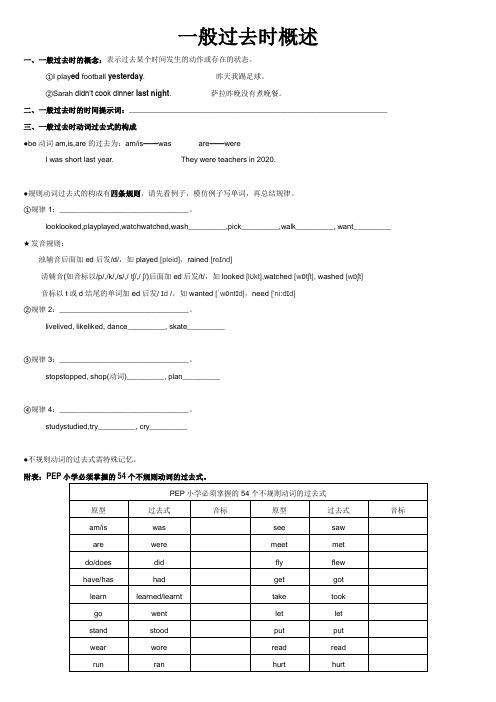
一般过去时概述一、一般过去时的概念:表示过去某个时间发生的动作或存在的状态。
①I play ed football yesterday. 昨天我踢足球。
②Sarah didn’t cook dinner last night. 萨拉昨晚没有煮晚餐。
二、一般过去时的时间提示词:______________________________________________________________三、一般过去时动词过去式的构成●be动词am,is,are的过去为:am/is——was are——wereI was short last year. They were teachers in 2020.●规则动词过去式的构成有四条规则,请先看例子,模仿例子写单词,再总结规律。
①规律1:_______________________________。
looklooked,playplayed,watchwatched,wash_________,pick_________,walk_________, want_________ ★发音规则:浊辅音后面加ed后发/d/,如played [pleid],rained [reɪnd]清辅音(如音标以/p/,/k/,/s/,/ tʃ/,/ʃ/)后面加ed后发/t/,如looked [lʊkt],watched [wɒtʃt], washed [wɒʃt]音标以t或d结尾的单词加ed后发/ɪd /,如wanted [ˈwɒntɪd],need ['ni:dɪd]②规律2:_______________________________。
livelived, likeliked, dance_________, skate_________③规律3:_______________________________。
stopstopped, shop(动词)_________, plan_________④规律4:_______________________________。
小学六年级英语语法一般过去时态讲解及习题
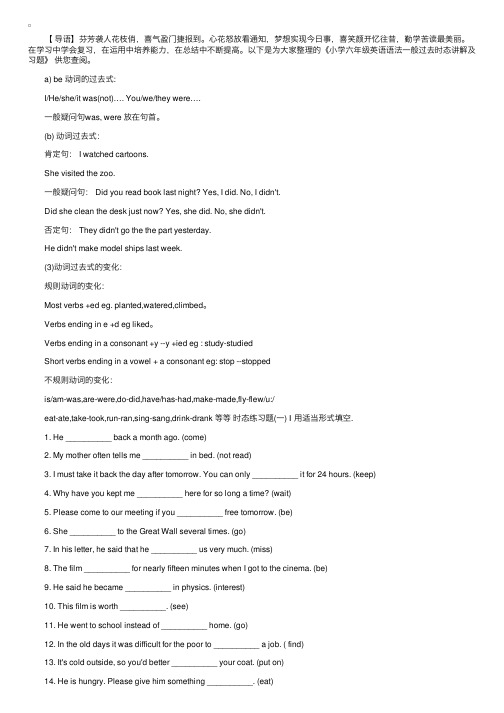
【导语】芬芳袭⼈花枝俏,喜⽓盈门捷报到。
⼼花怒放看通知,梦想实现今⽇事,喜笑颜开忆往昔,勤学苦读最美丽。
在学习中学会复习,在运⽤中培养能⼒,在总结中不断提⾼。
以下是为⼤家整理的《⼩学六年级英语语法⼀般过去时态讲解及习题》供您查阅。
a) be 动词的过去式: I/He/she/it was(not)…. You/we/they were…. ⼀般疑问句was, were 放在句⾸。
(b) 动词过去式: 肯定句: I watched cartoons. She visited the zoo. ⼀般疑问句: Did you read book last night? Yes, I did. No, I didn't. Did she clean the desk just now? Yes, she did. No, she didn't. 否定句: They didn't go the the part yesterday. He didn't make model ships last week. (3)动词过去式的变化: 规则动词的变化: Most verbs +ed eg. planted,watered,climbed。
Verbs ending in e +d eg liked。
Verbs ending in a consonant +y --y +ied eg : study-studied Short verbs ending in a vowel + a consonant eg: stop --stopped 不规则动词的变化: is/am-was,are-were,do-did,have/has-had,make-made,fly-flew/u:/ eat-ate,take-took,run-ran,sing-sang,drink-drank 等等时态练习题(⼀) Ⅰ⽤适当形式填空. 1. He __________ back a month ago. (come) 2. My mother often tells me __________ in bed. (not read) 3. I must take it back the day after tomorrow. You can only __________ it for 24 hours. (keep) 4. Why have you kept me __________ here for so long a time? (wait) 5. Please come to our meeting if you __________ free tomorrow. (be) 6. She __________ to the Great Wall several times. (go) 7. In his letter, he said that he __________ us very much. (miss) 8. The film __________ for nearly fifteen minutes when I got to the cinema. (be) 9. He said he became __________ in physics. (interest) 10. This film is worth __________. (see) 11. He went to school instead of __________ home. (go) 12. In the old days it was difficult for the poor to __________ a job. ( find) 13. It's cold outside, so you'd better __________ your coat. (put on) 14. He is hungry. Please give him something __________. (eat) 15. Please don't waste time __________ TV every evening. You should word hard at English. (watch) 16. We found the window __________. (break) 17. You have dropped your pencil. __________. (拾起它) 18. Mother often tells me __________ too late. (not come home) 19. You had better __________ by bus, or you will be late. (go) 20. I will __________ Li Ming the good news as soon as I see him.( tell) 21. Great changes __________ in our country since 1978. (take place) 22. I __________ my daughter since last month. (hear from) 23. It __________ me two days to write the article. (took) 24. Don't touch that __________ child. (sleep) 25. Every time he tried to start the car, the wheels __________ deepersintosthe mud. (sink) 26. When I got home, I found that my room __________ breaksintosand a lot of things __________. (steal) 27. If I had arrived there earlier, I __________ him. (meet) 28. I didn't remember __________ her the book before. (give) 29. He called at every door, __________ people the exciting news. (tell) 30. Yesterday Mary couldn't finish her homework, so she has to go on __________ it this afternoon. (do) 时态练习题(⼆) 1. We __________ football when it began to rain. We had to stop and go home. (play) 2. Xiao Lin __________ from here for about two hours. (be away) 3.swheres__________? Can you find your birth place on the map? Sorry, I can't. (be born) 4. Last night we __________ back home until the teacher left school. (not go) 5. Comrade Li Dazhao __________ in prison in 1927. (put) 6. Where is professor Lee? He __________ to the library. He'll come back soon. (go) 7. We could not help __________ after we heard the story. (laugh) 8. Would you please __________ me an English-Chinese dictionary when you come? (bring) 9. He told me that he __________ the Great Wall the year before. (visit) 10. I'll tell him the news as soon as he __________ back. (come) 11. The boy __________ by the door is my brother. (stand) 12. Do you remember __________ the film last year? (see) 13. There __________ a physics test next Monday. (be) 14. __________ I finish my homework in class? (必须) No, you needn't. 15. I'm sorry you've missed the last bus. It __________ ten minutes ago. (leave) 16. Wei Fang is heard __________ English every morning. (hear) 17. John stopped __________ a rest (have) because he __________ for three hours. (work) 18. I'm sorry to have kept you __________. (wait) 19. A new theatre __________ now. (build) 20. The boys __________ basketball on the playground are my classmates. (play) 21. I regretted answering like that, I was sorry __________ so. (do) 22. Can't you see I'm busy __________? (cook) 23. He __________ worried when coming into the teacher's office. (look) 24. __________ come beef! (随便吃点) 25. It's a great shame for me __________ in front of so many people. (laugh at) 26.Look!That man_ (open)the door of your car. 27.T.he moon_ (go)round the earth. 28.I must go now.It_ (get)late. 29.Let's go out.It_ (not/rain)now. 30.Julia is vera good at languages.She_ (speak)four languages very well. 31.Hurry up!Everybody_ (wait)for you. 32."_ (you/listen)to the radio?""No,you can turn it off." 33."_ (you/listen)to the radio?""No,just occasionally. 34.We usually_ (grow)vegetables in our garend but this year we_ (not/grow)any. 35.Ron is in London at the moment.He _ (stay)at the Park Hotel. He _ (always/stay)there when he's in London. 36.Can we stop walking soon?I_ (feel)tired. 37.Can you drive I_ (learn).My father_ (teach)me. ually I (finish)work at 5:00,but this week I (work)until 6:00to earn a bit more money. 39.My parents_ (live)in Bristol.They were bron there and have never lived anywhere else.。
小升初语法辨析一般现在时一般过去时一般将来时(讲义)人教PEP版英语六年级下册

小升初英语语法辨析:一般现在时、一般过去时、一般将来时&专项模拟练习一、一般现在时1.定义:表示经常发生的动作、存在的状态或普遍真理。
2.时间标志词:often(经常)、usually(通常)、always(总是)、sometimes(有时)、every day/week/month/year(每天/ 周/ 月/ 年)等。
3.结构:1.主语(非第三人称单数)+ 动词原形。
例如:You play basketball afterschool.(你放学后打篮球。
)2.主语(第三人称单数)+ 动词的第三人称单数形式。
例如:He playsbasketball after school.(他放学后打篮球。
)4.用法:1.表示经常性或习惯性的动作。
如:I go to school by bike every day.(我每天骑自行车去上学。
)2.表示现在的状态或特征。
如:She is tall and thin.(她又高又瘦。
)3.表示客观事实或普遍真理。
如:The earth moves around the sun.(地球绕着太阳转。
)二、一般过去时1.定义:表示过去某个时间发生的动作或存在的状态。
2.时间标志词:yesterday(昨天)、last week/month/year(上周/ 上个月/ 去年)、ago(……以前)、in + 过去的年份等。
3.结构:主语+ 动词的过去式。
例如:You played basketball yesterday.(你昨天打了篮球。
)4.用法:1.表示过去某个时间发生的动作。
如:I went to the park last Sunday.(我上周日去了公园。
)2.表示过去存在的状态。
如:He was happy yesterday.(他昨天很开心。
)三、一般将来时1.定义:表示将来某个时间要发生的动作或存在的状态。
2.时间标志词:tomorrow(明天)、next week/month/year(下周/ 下个月/ 明年)、in the future(在未来)等。
人教版小学六年级英语各时态结构总结及练习题(cy)
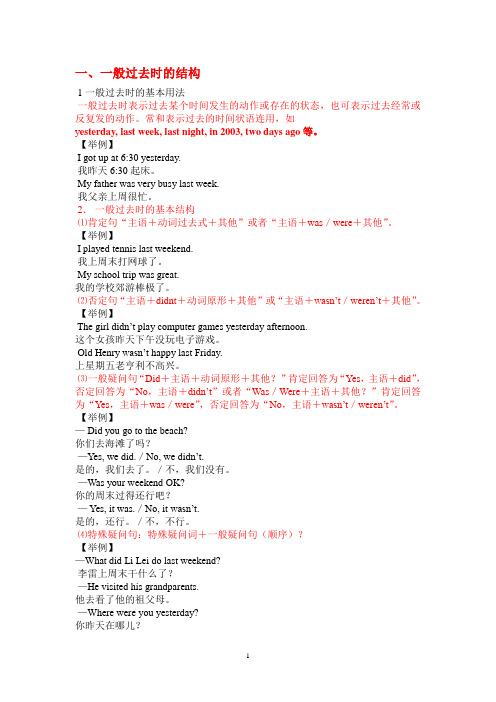
一、一般过去时的结构1一般过去时的基本用法一般过去时表示过去某个时间发生的动作或存在的状态,也可表示过去经常或反复发的动作。
常和表示过去的时间状语连用,如y esterday, last week, last night, in 2003, two days ago等。
【举例】I got up at 6:30 yesterday.我昨天6:30起床。
My father was very busy last week.我父亲上周很忙。
2.一般过去时的基本结构⑴肯定句“主语+动词过去式+其他”或者“主语+was/were+其他”。
【举例】I played tennis last weekend.我上周末打网球了。
My school trip was great.我的学校郊游棒极了。
⑵否定句“主语+didnt+动词原形+其他”或“主语+wasn’t/were n’t+其他”。
【举例】The girl didn’t play computer games yesterday afternoon.这个女孩昨天下午没玩电子游戏。
Old Henry wasn’t happy last Friday.上星期五老亨利不高兴。
⑶一般疑问句“Did+主语+动词原形+其他?”肯定回答为“Yes,主语+did”,否定回答为“No,主语+didn’t”或者“Was/Were+主语+其他?”肯定回答为“Yes,主语+was/were”,否定回答为“No,主语+wasn’t/were n’t”。
【举例】— Did you go to the beach?你们去海滩了吗?—Yes, we did./No, we did n’t.是的,我们去了。
/不,我们没有。
—Was your weekend OK?你的周末过得还行吧?— Yes, it was./No, it wasn’t.是的,还行。
/不,不行。
⑷特殊疑问句:特殊疑问词+一般疑问句(顺序)?【举例】—What did Li Lei do last weekend?李雷上周末干什么了?—He visited his grandparents.他去看了他的祖父母。
牛津沪教版六年级上Unit5基础语法讲解与练习
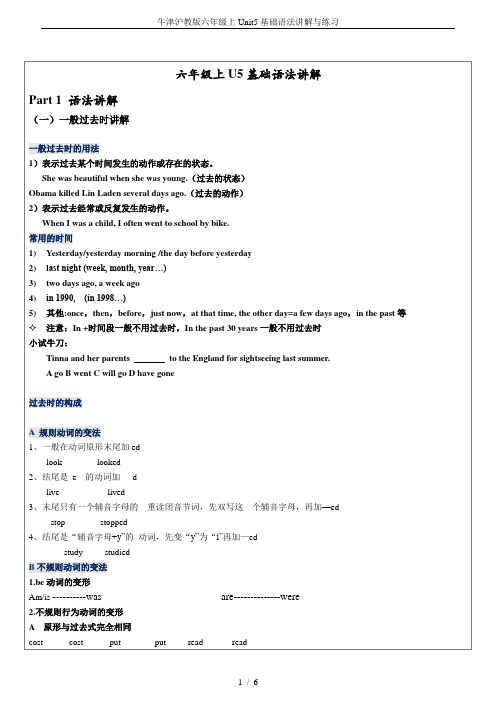
六年级上U5基础语法讲解Part 1 语法讲解(一)一般过去时讲解一般过去时的用法1)表示过去某个时间发生的动作或存在的状态。
She was beautiful when she was young.(过去的状态)Obama killed Lin Laden several days ago.(过去的动作)2)表示过去经常或反复发生的动作。
When I was a child, I often went to school by bike.常用的时间1)Yesterday/yesterday morning /the day before yesterday2)l ast night (week, month, year…)3)two days ago, a week ago4)in 1990, (in 1998…)5)其他:once,then,before,just now,at that time, the other day=a few days ago,in the past等 注意:In +时间段一般不用过去时,In the past 30 years一般不用过去时小试牛刀:Tinna and her parents to the England for sightseeing last summer.A goB wentC will goD have gone过去时的构成A 规则动词的变法1、一般在动词原形末尾加edlook looked2、结尾是e 的动词加-- dlive lived3、末尾只有一个辅音字母的重读闭音节词,先双写这个辅音字母,再加—edstop stopped4、结尾是“辅音字母+y”的动词,先变“y”为“i”再加—edstudy studiedB不规则动词的变法1.be动词的变形Am/is ----------was are--------------were2.不规则行为动词的变形A 原形与过去式完全相同cost---------cost put -----------put read----------readLet ---------let set------------set hit -----------hitB动词原形中的e变为oSell----------sold tell-------------told get------------gotC动词原形中的d变为tSpend----------spent lend---------lent send-------sentD动词原形中的ee去掉e,词尾加tFeel---------felt keep ----------kept sleep------slept这些规律没写全,希望学生课后找出其他规律注意特殊动词的变形说谎lie, lied躺lie, lay,下蛋,放置lay, laidE.g. A hen an egg; a boypicked it up , and it in the bag. Then he to his mother. There was no egg.一般过去时的基本句型1.系动词be的过去时.am(is) →was are →were陈述句:He was at home yesterday.否定句:He wasn’t at home yesterday.疑问句:Was he at home yesterday?Yes ,he was./No ,he wasn’t.2行为动词的一般过去时:陈述句主语+v-ed+其他I ate 100 eggs.否定句主语+did not /didn’t+v+其他I did not/didn’t eat 100 eggs.一般疑问句Did +主语+v+其他Did you eat 100 eggs?Yes, I did. /No,I didn’t.特殊疑问句疑问疑问词+did +主语+其他What did you eat?I ate 100 eggs练习1 写出所给词的过去式go _______ enjoy _______ buy _______ sit _______get _______ walk _______ take _______ dance ______write _______ run ______ swim _______ find _______begin _______ eat _______ play _______ study _______do _________ drink ____ sing ________ sleep_______2. 所给动词适当形式填空1. Tom and Mary ___________ (come) to China last month.2. Mike _________________(not go) to bed until 12 o'clock last night. So he ______ (get) up late.3. Mary __________ (read) English yesterday morning.(二)一般将来时讲解回顾定义:表示将来某一个时间将要发生的动作或存在的状态,也表示将来经常或重复发生的动作.一般将来时的标志:tomorrow(明天),the day after tomorrow(后天)next year(明年)next month(下一个月)next week(下一个星期)一般将来时的构成:1.主语+be(am,is,are) going to+V原形+......2.主语+will+V原形+.....3.一般疑问句:(1)be动词+主语+going to+动词原形+....(2).Will/+主语+动词原形+...4.特殊疑问句:(1).What(Where,How...)+be(am,is,are)+主语+going to+V原形+...?(2). What(When,Where,How...)+will+主语+V原形+...?注意:有些词如:go(去),come(来),leave(离开),start(开始)用现在进行时表示将来时.eg: (1)She is coming here tomorrow.(2) I am leaving this Friday.注意:"Be going to+动词原形+..." 表示一个事先考虑好的意图,,相当于文中的"打算,计划,准备"练习用动词的正确形式填空,每空一词。
人教版(新起点)-英语-六年级下册-一般过去时讲解
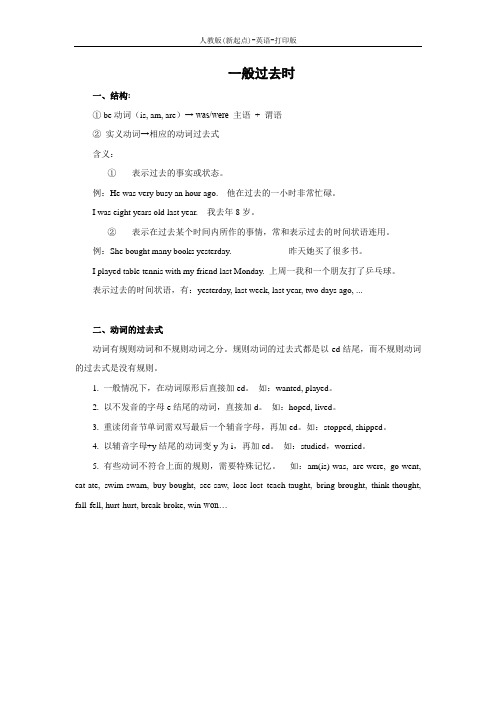
人教版(新起点)-英语-打印版一般过去时一、结构:① be动词(is, am, are)→ was/were 主语+ 谓语②实义动词→相应的动词过去式含义:①表示过去的事实或状态。
例:He was very busy an hour ago. 他在过去的一小时非常忙碌。
I was eight years old last year. 我去年8岁。
②表示在过去某个时间内所作的事情,常和表示过去的时间状语连用。
例:She bought many books yesterday. 昨天她买了很多书。
I played table tennis with my friend last Monday. 上周一我和一个朋友打了乒乓球。
表示过去的时间状语,有:yesterday, last week, last year, two days ago, ...二、动词的过去式动词有规则动词和不规则动词之分。
规则动词的过去式都是以-ed结尾,而不规则动词的过去式是没有规则。
1. 一般情况下,在动词原形后直接加ed。
如:wanted, played。
2. 以不发音的字母e结尾的动词,直接加d。
如:hoped, lived。
3. 重读闭音节单词需双写最后一个辅音字母,再加ed。
如:stopped, shipped。
4. 以辅音字母+y结尾的动词变y为i,再加ed。
如:studied,worried。
5. 有些动词不符合上面的规则,需要特殊记忆。
如:am(is)-was, are-were, go-went, eat-ate, swim-swam, buy-bought, see-saw, lose-lost teach-taught, bring-brought, think-thought, fall-fell, hurt-hurt, break-broke, win-won…。
小学六年级英语一般过去式语法知识点

小学六年级英语一般过去式语法知识点2)Be动词在一般过去时中的变化:am和is在一般过去时中变为was。
am,is----wasare在一般过去时中变为were。
3)动词过去式变化规则:1.一般在动词末尾加-ed,如:point-pointed,shout-shouted2.以不发音的e结尾加-d,如:like-likedlive-lived4)过去式“-ed”的发音规则1)动词词尾为“t,d”时,发/ id /音,want →wanted(要)need →needed(需要)(2)动词词尾为清辅音时,发/ t /音。
help →helped(帮助)laugh →XXX(笑)look →looked(看)kiss →kissed(吻)wash →washed(洗)(3)动词词尾为t,d以外之浊辅音或元音时,发/ d /音。
call→called(叫)stay→stayed(停留)cry→cried(哭)1)一般过去时时间标志语long longago(很久以前)。
one day(有一天),yesterday(昨天),last night(昨晚)。
three days ago(三天前)。
2)Be动词在一般过去时中的变化:am和XXX在普通曩昔时中变为was。
am,is----wasare在普通曩昔时中变为were。
3)动词过去式变化规则:1.普通在动词末尾加-ed,如:point-pointed,shout-shouted2.以不发音的e结尾加-d,如:like-likedlive-lived4)曩昔式“-ed”的发音划定规矩1)动词词尾为“t,d”时,发/ id /音,want →wanted(要)need →needed(需求)(2)动词词尾为清子音时,发/ t /音。
help →helped(帮助)laugh →XXX(笑)look →looked(看)kiss →kissed(吻)wash →washed(洗)(3)动词词尾为t,d以外之浊子音或元音时,发/ d /音。
- 1、下载文档前请自行甄别文档内容的完整性,平台不提供额外的编辑、内容补充、找答案等附加服务。
- 2、"仅部分预览"的文档,不可在线预览部分如存在完整性等问题,可反馈申请退款(可完整预览的文档不适用该条件!)。
- 3、如文档侵犯您的权益,请联系客服反馈,我们会尽快为您处理(人工客服工作时间:9:00-18:30)。
一,概念表示在过去某个时间里所发生的动作或存在的状态。
通常在句子里找到表示过去时间的词或词组。
如:yesterday, yesterday morning, yesterday afternoon, yesterday evening, the day before yesterday, last night, last week, last month, last year, a moment ago, just now, two days ago, a week ago, in 1990等。
如:I went to bed at eleven last night. 昨晚我11:00睡觉。
二动词过去式的构成规律(一)规则动词的过去式1,一般情况下+,在动词原形后面加-ed;Look--- looked play----played start--- started visit—visited2, 以不发音e结尾的动词,在词尾直接加-d;Live—lived use---used3, 以“辅音字母+y”结尾的动词,先将y 改成i,再加–ed;Study---studied try—tried fly---flied4,以重读闭音节(即辅音+元音+辅音)或 r 音节结尾,末尾只有一个辅音字母的动词,要先双写这个辅音字母后,再加–ed。
Stop---stopped plan---planned preferred(二)不规则动词的过去式1 改变动词中的元音;Begin--- began drink---drank come---came eat---ateGrow---grew run---ran know---knew win---won speak---spokeTake ---took write ---wrote get---got2 变词尾的-d 为-tBuild---built lend---lent send---sent spend--spent bend--bent3 与动词原形一样;Cut---cut put---put cost----cost hurt---hurt shut---shut4 变-ay 为—aid(少数动词)Say---said pay---paid lay---laid5 采用不同词根;Sell--- sold teach----taught buy----bought6 其他Am/is ---was are---were have/has--- had do---did二加–ed 后的读音方法1 ed加在清辅音后面读/t/Finished/-t/ help /-t/ asked/-t/2 ed 加在浊辅音或元音结尾的,读/d/Played/-d/ lived/-d/ enjoyed/-d/3 ed 加在/t/或/d/后面,读/id/Wanted /-tid/ needed/-did/ visited /-tid/过去时练习:写出下列动词的过去式Is\am______ fly___ plant_____ are_____ drink_____Play ______ go____ make______ does_____ dance_____Worry______ ask____ taste_______ eat_____ draw_____Put_____ throw______ kick_______ pass_____ do______用所给动词的适当形式填空1 We_____ (live) in Japan last year.2 Susan_____(stop) the car on the street yesterday.3 My mother____(clean) my room and I _____( study) for the English test last Sunday.4 What____ you_____(do) last night?5 On Saturday morning I ____(play) football二用括号内所给动词的适当形式填空(1)May_____(finish) her homework very late yesterday evening.(2)Han Mei_____(bring) her pet to the park that day.(3)His father______(buy) a new computer for him last week(4)Miss Du______ (walk) to work every day last term.(5)We____(move) to Shenyang 8 years ago.(6)_____ you _________(have) bread for breakfast this morning?(7)She_______(give) me a nice present last night.(8)The police______(stop) the car and_____(catch) the thief (小偷) just now.(9)Tom ____(carry)water for the old man last Saturday.(10)Uncle Wang______(come)into the room and______(find) something to eat.(11)Lily______(study)in the classroom for two hours and then ____(leave).(12)Jimmy______(do) a lot today. He______(go) shopping and _____(cook)supper.(13)We_____(go) to the cinema last night. The film_____(be)very good.(14)What time ______you________(get) to school this morning?三句子变化(一)一般过去时的一般疑问句1.把 was, were放在句首,其余位置不变。
由Was…? 引导的一般疑问句,肯定答为:Yes,… was. 否定回答为:No,…wasn’t 由Were…?引导的一般疑问句,肯定回答为:Yes,…were.否定回答为:No,…weren’t.如:(1)I was born in Shanghai. ----Were you born in Shanghai?---Yes, I was.(肯定回答) ----No, I wasn’t(否定回答)(2)They were in Li Yan’s home last night. ----Were they inLi Yan’s home last night?--Yes, they were.(肯定回答) --No, they weren’t(否定回答)2.在行为动词的句子中,要用助动词did 来引导,其余的语序不变。
要注意的是,要把行为动词的过去式改为原形。
肯定回答为:Yes,…did 否定No,…didn’t.如:John played computer games last night.---Did John play computer games last night?Yes, he did. No,he didn’t(二)一般过去时的否定句1 在表示过去存在的状态的句子中,相接在was, were的后面加上not。
如:(1)H e was in the park the day before yesterday.He was not in the park the day before yesterday.(2) We were busy last week.We were not busy last week.2 在表示过去的时间发生的动作的句子中,要在行为动词的前面加助动词didn’t. 然后把过去式的行为动词改为动词原形。
即:didn’t+ 动词原形。
如(1) She played the violin last night.She didn’t play the violin last night.(2) They swam in the lake yesterday.They didn’t swim in the lake yesterday.(三) 一般过去式的特殊疑问句1.What did…? (主要是询问过去发生了什么事情,注意要把过去式改为动原形。
)We ate Chinese food last night.What did we eat last night?2.Where did ?(主要是询问过去事情发生的地方)They sang and dance in the music room yesterday morning.Where did they sing and dance yesterday morning?3.Who +动词过去式…? (主要是询问过去事情发生的人物)Mike and Tom climbed mountains last weekend.Who climbed mountains last weekend?四句子结构1 在表示某个时间里存在的状态的句子,系动词用过去式was,were 构成。
如:(1)I was at home yesterday. 昨天我在家。
(2)W e were in the gym just now. 刚才我们在体育馆、2 在表示过去某个时间里发生的动作,用动词的过去式构成。
如:I visited my uncle yesterday. 昨天我拜访了我的叔叔。
3 各种句式(1)一般过去时的肯定陈述句:主语 + 动词过去式 + 宾语或表语。
He worked in Shanghai ten years ago.(2)一般过去时的否定句:a. 主语 + didn’t + 动词原形 + 宾语。
(did+not=didn’t)He didn’t do morning exercises yesterday.b.主语 + wasn’t/weren’t + 表语。
(was+not=wasn’t were+not=weren’t)(3)一般过去时的一般疑问句:a. Did + 主语 + 动词原形 + 宾语?Did you study English in `1990?b. Was/Were + 主语 + 表语?Was he a pupil five years ago?(4) 一般过去时的特殊疑问句:a 特殊疑问词 + did + 主语 + 动词原形 +宾语?Where did your parents live five years ago? What did you do last Sunday?b 特殊疑问词 + were/ was + 表语?Who was at the zoo yesterday?。
